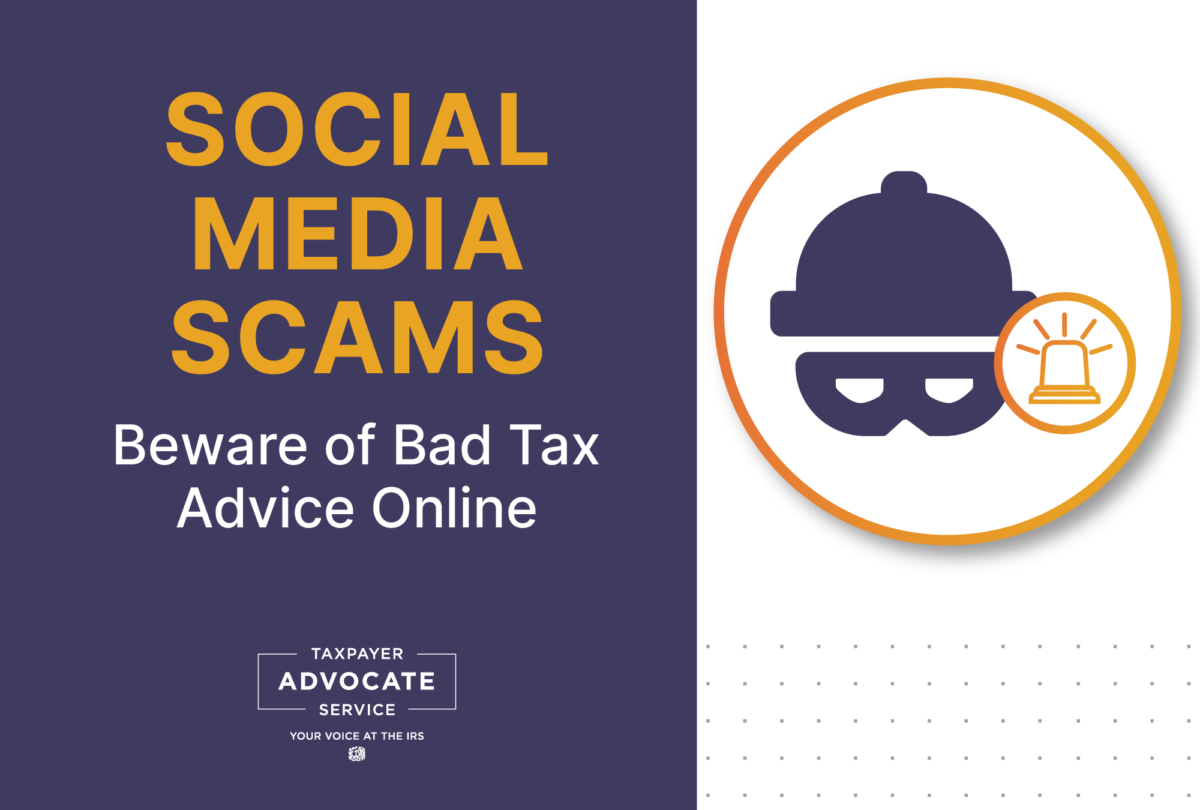

Have you seen some too good to be true ads online or on social media, promising huge tax breaks or massive refunds because you drive a vehicle? You’ve probably recently seen social media influencers say that you qualify for the fuel tax credit. Sometimes the influencers will tell you that, because you drive a car, you can write off the cost of the gas you purchase on your taxes. This is not true; you must meet certain strict qualifications to claim this credit. As you can tell, social media schemes are often advertised as ways to legally reduce your taxes.
It might be a tempting choice to follow their “advice;” however, not all of these schemes are legal and they can lead to serious consequences for you.
The IRS continually sees examples of how bad actors are targeting taxpayers. TAT recently published information about some of the most popular social media schemes currently targeting taxpayers. Free tax advice is easy to find on social media and is part of the IRS’ annual Dirty Dozen campaign. This campaign is a list of 12 scams and schemes involving topics such as:
These schemes put you and professional tax preparers at risk of losing money, personal information, data, and more.
Common types of social media schemes involve:
These sources may claim to be tax professionals, but they are not qualified to give tax advice. Unqualified tax return preparers usually don’t follow ethical standards and may engage in fraudulent activities.
The Taxpayer Advocate Service (TAS) urges you to research the best way to chose an honest tax return preparer. If you do, you’re much less likely to fall victim to social media scams.
“Insufficient tax literacy can make taxpayers vulnerable to falling victim to scams, which can have huge financial and emotional costs for those individuals,” said National Taxpayer Advocate Erin M. Collins in her 2024 Annual Report to Congress. “Scams are another Most Serious Problem facing taxpayers, with millions of Americans losing billions of dollars to tax-related scams. A key aspect of scams is social media influencers spreading disinformation, and insufficient tax literacy can make taxpayers vulnerable.”
To avoid falling for bad advice on social media, look for a preparer who has a valid Preparer Tax Identification Number and is registered with the IRS. You can also check their credentials, experience, and any reviews or complaints before hiring them. For more tips on how to select a trusted tax professional visit our Choosing a Tax Return Preparer page.
TAS urges you to be cautious of any scheme that promises to reduce your taxes significantly. Before claiming a credit or deduction that you aren’t sure you are entitled to, be sure to do your research and seek advice from a qualified tax professional. Remember, if something seems too good to be true, it probably is!
If you are unsure whether you qualify for a certain credit or deduction, contact the IRS or a certified tax professional to ask. You can also get good tax information from tax return software and IRS.gov.
By staying informed and vigilant you can protect yourself from the dangers of fraudulent tax advice and ensure your financial stability for years to come.
If you filed a return or someone filed for you, that wrongly claimed credits or deductions, you’ll need to file an amended return that removes them. This is also true if you wrongly claimed credits or deductions on last year’s return but the IRS still issued the full refund, as the IRS usually has three years to audit a return. However, that the IRS has an unlimited amount of time to audit your return if it’s fraudulent, even if the preparer, not you, had the intent to evade legally owed taxes.
You are responsible for everything on your tax return, even when someone else prepares it. Correcting your return before the IRS contacts you may help avoid some types of penalties.
If the IRS has already contacted you with questions about your return, you will either need to justify that you can claim everything or file an amended return. You may have a very short time to act, so don’t delay if they contact you.
TAS may be able to help! For example if you are experiencing a financial hardship or your amended return removing improperly claimed credits, delays processing your tax return. TAS will advocate for you to receive all credits and deductions for which you are eligible and will work with you to correct anything incorrectly claimed.